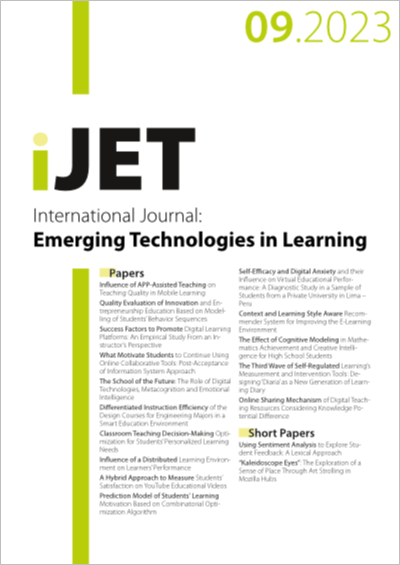Self-Efficacy and Digital Anxiety and their Influence on Virtual Educational Performance
A Diagnostic Study in a Sample of Students from a Private University in Lima – Peru
DOI:
https://doi.org/10.3991/ijet.v18i09.36183Keywords:
ICT Self-efficacy, computer anxiety, computer self-efficacy, online teaching, digital sourcesAbstract
Digital self-efficacy is the degree of confidence to efficiently use technological tools. This type of self-efficacy reduces digital anxiety and increases students' performance in virtual environments. This justifies the objective of the present research, which is to analyze the levels of self-efficacy and digital anxiety, as well as their influence on virtual educational performance in students of a private university in Lima, Peru. Using a non-probabilistic convenience sampling procedure, 116 students participated, 105 females (90.5%) and 11 males (9.5%) between 17 and 50 years of age (MeanAge = 26.78, SD = 7.02). The results showed that students perceived to agree in having optimal levels of digital self-efficacy and efficient virtual educational performance. However, they indicated neither agreement nor disagreement in feeling digitally anxious. In addition, it was observed that digital self-efficacy is related to virtual educational performance; and digital anxiety was higher in the older study cycles. The results dispute the concept of "digital native" because age was not related to high levels of self-efficacy, digital performance, or low levels of digital anxiety.
Downloads
Published
How to Cite
Issue
Section
License
Copyright (c) 2023 Ivan Iraola Real, Carla Vasquez, Iván Díaz

This work is licensed under a Creative Commons Attribution 4.0 International License.



